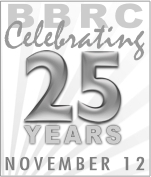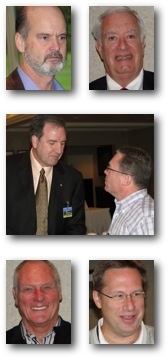 |
||
• BBRC WEEKLY NEWSLETTER • VOL 23, NO 19, NOVEMBER 9, 2010 • |
||
IN THIS ISSUE
"At The Heart of Leadership," Tom Flick, President of Tom Flick Communications | Invocation, Guests & Visiting Rotarians | Student of the Month: Isaac Wilson | Rotary International Foundation | Induction of New Member: Bill Prater | New Board Members For 2011-12 | BBRC Silver Anniversary Party | Last Minute Announcements | Web Fun
NO MORNING MEETING THIS FRIDAY!
REPLACED BY:
BBRC 25th Anniversary Dinner Party, Cascade Club at Trilogy
More Information
THOUGHT FOR THE WEEK
Chuck Kimbrough said, "I did a little presidential research." Most of the U.S. Presidents "were kind of dull really, but John Quincy Adams said, 'If your actions inspire others to dream more, learn more, do more, and become more, you are a leader.'"
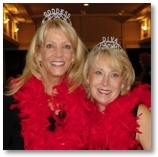
Jenny Andrews & Margie Burnett
Jenny Andrews, after bidding the club a characteristically cheery "Good Morning!" invited the members to "pause a moment to reflect." She then faithfully offered the following invocation:
- "Almighty God, With grateful hearts we thank you for this food, for the sun, soil and rain that nurtured it, for the industry of the farmers who produced it; and for the patience of those who serve it. May we enjoy the fellowship it creates and be strengthened for service as we partake in peace and joy. And each and every one of us Lord, regardless of our diverse emotions about the outcome of our recent elections, thank you that we are blessed to live in the United States of America—the land of the free and the home of the brave. Amen.
Jenny then led the patriotic audience in the Pledge of Allegiance to the Flag.
Our effervescent Past-President, Margie Burnett, presented a couple of visiting Rotarians: the ubiquitous Frank Young from the Bellevue Rotary Club and the honorable Marcie Maxwell, newly re-elected State Representative for Washington's 41st District and former President (2007/2008) of the Rotary Club of Renton. Several fine and worthy guests were also present, but whose names were not recorded by the incompetent club reporter.
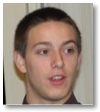
Student of the Month Isaac Wilson
Bob Holert presented our BBRC Student of the month, Isaac Wilson, of Sammamish High School. The son of Gordon and Susan Wilson, Isaac has distinguished himself academically, taking a number of Advanced Placement courses while also participating in band and orchestra. In addition to his curricular pursuits, he has spent hundreds of hours in community service.
Isaac's favorite cause is the Walk for Aidan. He informed the club:
- The Walk for Aidan is a student-created and student-led fundraiser at Sammamish High School that is currently in its fifth year. The Walk was started after Mitch Leffler, a P.E. and English teacher at Sammamish, announced that his son, Aidan, had been diagnosed with Duchenne Muscular Dystrophy. Duchenne is a disease that occurs when the body does not properly produce a protein called dystrophin. Dystrophin is vital in rebuilding muscles and keeping them running. Without it, muscles slowly degrade into fatty tissue, starting at the legs and moving upwards. Typically, victims of Duchenne lose the ability to walk by age 10 and pass away in their late teens or early twenties.
- Aidan is seven now, meaning that our time is growing shorter. The money we raise goes to his family to cover a variety of costs, including, but not limited to, clinical trials, experimental medications that cost more than $10,000 a year, outfitting their house and car for a wheelchair and medical care that is not covered by the Lefflers' insurance. The Lefflers receive 100% of the proceeds from the Walk and donate 50% of it to an organization called Charlie's Fund that is dedicated to finding a cure for Duchenne.
- The Walk for Aidan will be on May 21, 2011, a Saturday, at the Sammamish High School sports field. We draw over 1200 people every year and have so far raised $150,000 in four years. Any and all help would be appreciated. Anyone may contact me for more details at lakeside00@gmail.com.
Isaac plans to attend Brigham Young University-Provo and become a teacher after graduation. At the risk of rank editorializing, the Reveille editor comments that it may be hoped as well that he will become a Rotarian, as he has already deeply internalized the Four-Way Test that serves as our code of ethics. President Chuck Kimbrough summed up the feelings of the assembled Rotarians by concluding, "I want to congratulate Gordon Wilson because he has a super son."


Dick Brown & Jeff Cashman
Dick Brown reminded the Club that the Rotary International Foundation began in 1917. In its early years, the Foundation focused all its efforts on educational projects. In the 1960's, however, it began to focus on humanitarian projects. After Brown and Jeff Cashman further regaled the significant achievements of the Foundation, they passed the microphone to Kim Shrader, who reviewed several suggested options and gave some examples of what your donation to the Rotary International Foundation could potentially provide. He had handouts on the table at giving levels of $100, $300, $500, and $1,000. For example a $300 donation could potentially provide for 12 cataract surgeries, or 60 mosquito nets, or 500 doses of the polio vaccine.

Kim Shrader
Kim went on to review the ways to give: (1) writing a check; (2) charging it; (3) making a quarterly pledge and having it added to your quarterly bill; or (4) setting up directly with the RI Foundation for a monthly withdrawal. Our club and District's goal is "every Rotarian every year donating to the RI Foundation."
President Chuck returned to the dais and, gratefully acknowledging the help of the other members, made a "small pitch" on the issue, calling for 100% participation this year from BBRC members.
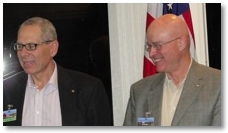
John Martinka & Bill Prater
The humorously humble club president, in intriguingly introducing the induction of an invaluable new integrant, said, "We'll do them one at a time now," referring subtly but unmistakably to the previous week's debacle with his reading glasses while inducting four new members simultaneously. He then flawlessly conducted the induction of Bill Prater into the BBRC. The highly distinguished new member was sponsored by John Martinka and Alan Bohling.
Kimbrough then quoted Winston Churchill as saying, "What you do is how you make a living. What you give is how you make a life." He then said, "Give the BBRC a piece of your life, and we'll give you the fellowship and support of millions of fellow Rotarians around the world." Kimbrough then introduced Prather to the club with the pleasing and comforting traditional epithet of "the newest Rotarian in the World."
John Martinka asked the club, "What's the importance of four weeks from today?" Answering his own question, he said, "We elect our slate of officers for the next Rotary year." He then asked all present and former members of the BBRC board to stand and talked about some of the responsibilities new officers were taking on. Obviously, Chuck Kimbrough will be the past president next year. Other officers will be:
- President: John Martinka
- Treasurer: Al Forney
- Club Admin: Tom Smith
- Public Relations: Kaj Pederson
- Community Service: Jane Kuechle
- Membership: Colleen Turner
- International Service: Mike Ralph
- Foundation: Kim Shrader
- Secretary: Lee Smith
- Sergeant At Arms: Wendi Fischer
- President-Elect: Chris Monger
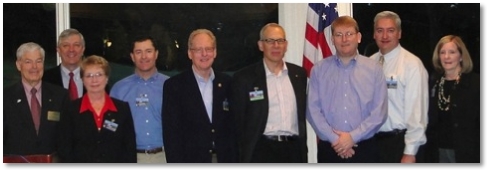
L-R: Chuck Kimbrough, Tom Smith, Lee Smith, Mike Ralph, Kim Shrader, John Martinka, Kaj Pedersen, Alan Forney, and Jane Kuechle
Kimbrough praised the group, saying, "I think it's a great team. You'll be well led, and there will be great continuity. We'll get better and better at all the things we do." A picture was taken of the "squeezed" group.

Tim Leahy
Tim Leahy began by saying, "Next Tuesday, the voters of America will have an opportunity to send a clear message to Washington ... no, hang on ... next Friday, the members of the BBRC will have the opportunity to 'par-tay' at the Trilogy Golf Course, celebrating 25 years of the BBRC." He promised members great entertainment and incredible food, but helpfully warned that members needed to register online before the end of the day (5:00 p.m.).
Members were also reminded that there will be no breakfast next Friday morning.
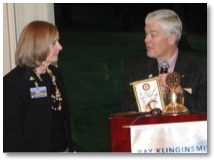
Jane Kuechle presents a Rotary Club flag to President Chuck Kimbrough
Jenny Andrews mentioned that Jane Kuechle had just returned from Ethiopia, and Jane brought a flag from the Addis Ababa East Club, the oldest Rotary Club in Ethiopia.
John Martinka expressed thanks to John Cherry.
The Major Grants Committee is revving up to receive grant applications, and Lee Smith invited applications.
A holiday giving tree was announced by Christine Addison
Anna Cummins presented a food drive sponsored by her business, with a goal of 1,000 pounds of food for the holidays.
"At The Heart of Leadership," Tom Flick, President of Tom Flick Communications

Tom Flick
President Chuck turned the floor over to Michel Carter, whom he called an "Irish Raconteur Extraordinaire." Mr. Carter began by saying, "I have the distinct honor of introducing the speaker for the day, Tom Flick." He then went on to say, "Teamwork, total commitment, maximum effort, leadership, and winning are all terms we have heard used in the business environment, but nowhere are these principles more intense than the 60 minutes of a professional football game."
A hometown hero, Mr. Flick grew up in Bellevue and later attended the University of Washington, where he was a star quarterback, leading the Don James-coached Huskies to multiple Bowl games, including the Rose Bowl. He then spent seven years in the National Football League.
"Since 1988," said Carter, "Mr. Flick has tackled the business world by addressing over 100,000 men and women each year on high performance strategies for leadership, teamwork, change, and personal growth. His clients are a venerable who's-who list of companies — Microsoft, Starbucks, American Express, Ritz-Carlton Hotels, PepsiCo, Shell Oil, Hallmark Cards, NASA, and the US Army Rangers, to name a few." Carter added that Flick has been "happily married since 1985" to his wife, Molly, with whom he has two children. "An avid fly-fisherman, golfer, and reader," Carter winsomely noted, "Tom is most proud of his role as husband and father."
Mr. Flick then thanked his antelocutor and greeted the club. "I was introduced as a football player, but as I travel around the world, things have changed. I'm not as big as I used to be." He then told a humorous anecdote of meeting a lady on plane who, hearing about his consulting work, said, "Have you done this your whole career? "No," he said, "I was a football player." "Oh," she replied with a confused look. "Were you a high school football player?" He assured her that no, he had been a professional player in the NFL. "You must have been a kicker," she assumed.
Entering the substance of his talk he noted, "We all have cell phones attached to us." The industry leader in the 1990s was Motorola, but in 1996-97 there was a change from analog to digital. Motorola had gotten so big that their challenge was to manage their size, "which is," he said, "the death of all companies." Consequently, a small company called Nokia that had been a forest products company in Finland came out of nowhere and displaced Motorola as the leader. "Competition is coming," he warned. "If we're not getting better than the competition, we are falling behind. Companies are all trying to get an edge, take market share, become leaders in their field."
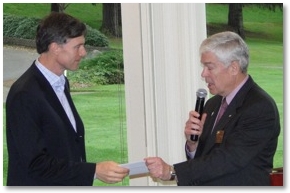
President Chuck Kimbrough thanks Tom Flick for his presentation.
Returning to his experience in football, he recalled, "In 1981 I was drafted into the NFL and became a backup quarterback. We were Losing 17-0 against the Steelers, and I was sent in. All of a sudden, this voice in my head started to click: 'Tom, it's time to go to work.'" He recounted how he had started scanning the defense to see whether to audibilize. "Businesses," he interjected, "are constantly doing this. Great businesses consistently do two things: seize opportunities while avoiding hazards." Returning to his tale, he said, "As I started my scan of the defense from left to right, I saw a middle linebacker standing in front of me, Jack Lambert." Lambert was a 6'3", 225-pound Hall of Famer with 4 super bowl rings. "What I noticed was that he had no teeth in his head," he said, showing a picture on the screen and eliciting laughter from the bemused club members. "Lambert is now a game warden in PA. Think about that," he chuckled. "You are fishing on a river and he shows up!"
Flick recalled thinking, "Jack, I'm going to build a relationship with you." He continued, "He sees me instead of Joe Theismann, our starting quarterback. He yelled at me so loud the whole team heard it." "Hey, who are you?" spit out the toothless challenger. "The whole offensive lined turned around to see who I was," he said. "I handed off to someone, and we scored. But we lost the game." Finishing his story, he said, "We showered, got our suits on, and got on the plane. As we took off, I couldn't get the image of Jack out of my head. Who are you? The words penetrated 18 inches into my heart."
Flick went on to ask the club the same question, as well as three more: Who are you? Where are you going? What does the future look like? Who's going to lead us?
Two of the challenge companies face, he said, are those of complacency and false urgency. "Complacency is born out of success — what I'm doing is just fine. False urgency is based on fear and anxiety." Such urgency, he summed up, "does nothing to advance the ball down the field." What we want, he said, is "True Urgency."
Flick suggested that companies need 75% leadership and 25% management. Instead, he offered, "we have trained intelligent people to be managers in recent years. That is critical, but doesn't advance the ball down the field. Moving forward has become an intellectual enterprise."
"Companies fail to pursue big, compelling dreams," the speaker explained. "John Kennedy's project to send a man to the moon and bring him back safely blew people's minds. Our collective ideas came to the forefront and we started doing things we had never dreamed possible." He added, "[The Rev. Dr.] Martin Luther King, Jr., didn't say, 'I have a strategic plan!' He had a dream." That dream, he said, made [civil rights] legislation that was doomed to fail, pass.
Flick continued with the story of Ernest Shackleton's trip to explore the South Pole. "In 1914, you can imagine yourself in London in November, it is snowing, but there is a crackling fire inside. The newspaper has an ad by Ernest Shackleton:
"Five thousand answered the ad." Flick's point is that people are inspired by big dreams.
"I think we have been traditionalized and socialized to think that leadership belongs to the person with the highest degree, a title, a big bank account or a corner office," he said, "but at Southwest Airlines, they say if you can't lead, you can't even be a baggage handler there."
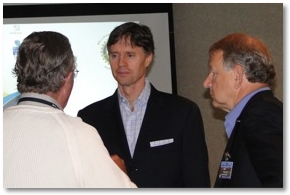
Tom Flick talks with members after the meeting.
In a recent conversation with a futurist, Flick was told that "we are leaving the information age. Information Technology is leaving us feeling isolated and ignorant." In contrast, Ken Blanchard shares a story about a recent stay at the Palm Beach Ritz-Carlton Hotel.
When he received his wake-up call at 7:00 a.m., the greeter said, "Good morning, Mr. Blanchard, this is Rita." She proceeded to give him a sunny California weather report and then a summary of his itinerary.
She said, "I'm sorry you're leaving. New York's weather is bad. Would you consider staying a few more days?"
"Who are you," he asked, "the hotel manager?"
"No," she replied cheerily. "I'm in housekeeping; I'm a maid. We don't think anyone should be awakened by a recording."
Flick reflected that after hearing that story, he was at the Waldorf-Astoria in New York and was so disappointed when he got a recording. But Blanchard felt inspired by the wake-up call. He urged the club members to continue to inspire people with their integrity, vision, and energy.
"As you leave here," he said, "take your phone and instead of checking your messages, call someone and tell them you love them and believe in them. Then call a client and leave a message. Say, 'I was just at a Rotary meeting, just wanted to call and say thanks for trusting me with your business. No need to call me back.'"
Telling a final story, he recounted an event which occurred at a recent Seattle Special Olympics. The stadium was packed with people who loved the kids that were participating. When the gun sounded, one boy stumbled and fell, skinning his elbow. He started to cry, and all eight runners heard him. They turned around and went back to him. A little girl with Down's Syndrome kissed him on the forehead and said, "This will make it better." Then all the runners locked arms and walked to the finish line together to a standing ovation.
"Winning is great, but helping others win is even better," he finished. "Our job is creating winners. Nowhere is that better exemplified than here at Rotary."
In short, Flick's presentation lived up to its billing, that he would:
Explain how leaders who positively engage not just the minds, but also the hearts of their people, consistently achieve stronger mission awareness, higher productivity, and better sales performance. The competitive and newly global nature of business presents a greater challenge for today's leaders. No longer can one charismatic individual lead the vision alone. The catalyst for sustained high-level performance is leadership, from top to bottom, which empowers every individual.
Questions were then invited:
"How do we get some leadership in Washington?" quipped Jim Kindsvater, apparently referring to the "other Washington."
"It's a complacency issue," replied Flick. "Look how busy we are; we must be getting something done."
Paraprosdokians
Courtesy of Ann Norman
A paraprosdokian is a figure of speech in which the latter part of a sentence or phrase is surprising or unexpected in a way that causes the reader or listener to reframe or reinterpret the first part. It is frequently used for humorous or dramatic effect, sometimes producing an anticlimax.
- If I agreed with you, we'd both be wrong.
- We never really grow up, we only learn how to act in public.
- War does not determine who is right — only who is left.
- Knowledge is knowing a tomato is a fruit. Wisdom is not putting it in a fruit salad.
- The early bird might get the worm, but the second mouse gets the cheese.
- To steal ideas from one person is plagiarism. To steal from many is research.
- A bus station is where a bus stops. A train station is where a train stops. On my desk, I have a work station.
- A bank is a place that will lend you money, if you can prove that you don't need it.
- I didn't say it was your fault, I said I was blaming you.
- Behind every successful man is his woman. Behind the fall of a successful man is usually another woman.
- A clear conscience is usually the sign of a bad memory.
- You do not need a parachute to skydive. You only need a parachute to skydive twice.
- Always borrow money from a pessimist. He won't expect it back.
- A diplomat is someone who can tell you to go to hell in such a way that you will look forward to the trip.
- Hospitality: making your guests feel like they're at home, even if you wish they were.
- I used to be indecisive. Now I'm not sure.
- When tempted to fight fire with fire, remember that the Fire Department usually uses water.
- You're never too old to learn something stupid.
- To be sure of hitting the target, shoot first and call whatever you hit the target.
- Some people hear voices. Some see invisible people. Others have no imagination whatsoever.
- A bus is a vehicle that runs twice as fast when you are after it as when you are in it.
- Change is inevitable, except from a vending machine.
